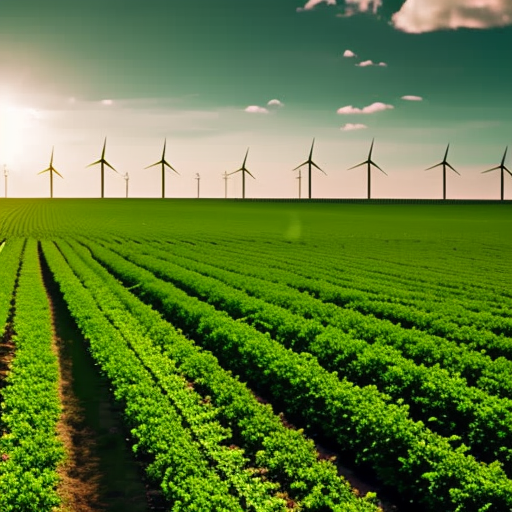Sustainable Farming: A Path Towards Environmental Stewardship and Food Security
Sustainable farming is an approach to agriculture that aims to meet the needs of the present generation without compromising the ability of future generations to meet their own needs. It emphasizes the responsible use of natural resources, the protection of biodiversity, and the promotion of long-term environmental health. By adopting sustainable farming practices, farmers can minimize negative impacts on the environment, improve soil fertility, conserve water, and reduce greenhouse gas emissions.
Key Principles of Sustainable Farming
1. Soil Health: Sustainable farming recognizes that healthy soil is the foundation of a productive farm. Farmers employ techniques such as crop rotation, cover cropping, and organic matter addition to enhance soil fertility, structure, and nutrient content. These practices help to reduce erosion, improve water infiltration, and promote beneficial soil microorganisms.
2. Water Conservation: Sustainable farming practices prioritize the efficient use of water resources. Farmers employ techniques like drip irrigation, rainwater harvesting, and precision watering to minimize water waste. By reducing water usage, sustainable farming helps to conserve this precious resource and protect aquatic ecosystems.
3. Biodiversity Conservation: Sustainable farming recognizes the importance of preserving biodiversity on and around farms. Farmers implement strategies such as planting hedgerows, creating wildlife habitats, and avoiding the use of harmful pesticides to promote biodiversity. By providing habitats for beneficial insects and wildlife, sustainable farming helps to maintain ecological balance and reduce the need for chemical inputs.
4. Integrated Pest Management (IPM): Sustainable farming practices prioritize the use of IPM techniques to manage pests and diseases. Farmers employ a combination of cultural, biological, and chemical control methods to minimize the use of synthetic pesticides. This approach reduces the negative impact on beneficial insects, soil organisms, and human health.
5. Energy Efficiency: Sustainable farming aims to reduce energy consumption and reliance on non-renewable energy sources. Farmers adopt energy-efficient technologies such as solar-powered irrigation systems, energy-efficient machinery, and renewable energy generation. By reducing energy consumption, sustainable farming helps to mitigate climate change and decrease greenhouse gas emissions.
The Benefits of Sustainable Farming
1. Environmental Protection: Sustainable farming practices help to protect natural resources, reduce pollution, and preserve biodiversity. By minimizing the use of synthetic inputs and promoting ecological balance, sustainable farming contributes to the conservation of ecosystems and the preservation of wildlife habitats.
2. Improved Soil Health: Sustainable farming practices enhance soil fertility, structure, and nutrient content. This leads to increased crop yields, improved water infiltration, and reduced erosion. Healthy soils also act as carbon sinks, helping to mitigate climate change by sequestering carbon dioxide from the atmosphere.
3. Water Conservation: Sustainable farming practices reduce water waste and promote efficient water use. By employing techniques such as drip irrigation and rainwater harvesting, farmers can minimize water consumption and contribute to the conservation of water resources.
4. Enhanced Food Safety: Sustainable farming practices prioritize the use of organic and natural inputs, reducing the reliance on synthetic pesticides and fertilizers. This leads to the production of healthier, safer, and more nutritious food for consumers.
5. Economic Viability: Sustainable farming practices can improve the economic viability of farms by reducing input costs, increasing yields, and accessing premium markets. By adopting sustainable practices, farmers can enhance their resilience to climate change, market fluctuations, and other challenges.
The Future of Sustainable Farming
As the world faces pressing challenges such as climate change, soil degradation, and water scarcity, sustainable farming is gaining increasing recognition as a viable solution. Governments, organizations, and farmers are increasingly embracing sustainable farming practices to ensure long-term food security, protect the environment, and promote sustainable development. By supporting and investing in sustainable farming, we can build a more resilient and sustainable agricultural system for future generations.












